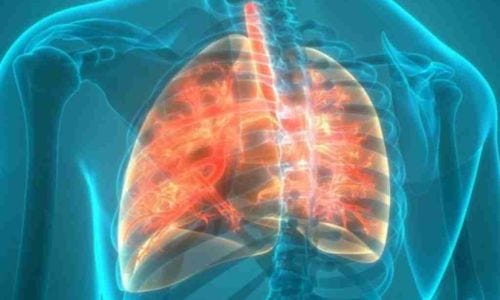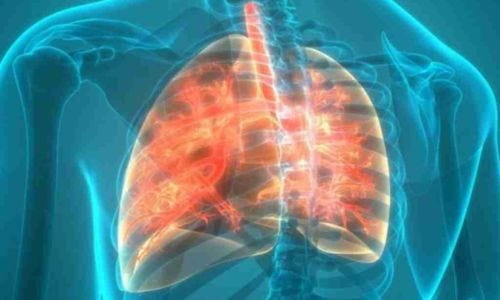Cystic fibrosis (CF) affects about 30,000 Americans. Worldwide, about 70,000 to 100,000 people have this condition. It affects males and females at about the same rate. About 75 percent of new diagnoses happen before age 2. 1

What is Cystic Fibrosis?
CF is a genetic disorder that affects the respiratory and digestive systems. It affects the body's cells, and causes the production of abnormally thick mucus, leading to the blockage of the pancreatic ducts, intestines, and bronchi and often resulting in respiratory infection.
What Are Cystic Fibrosis Symptoms?
Symptoms vary and can include:
- Cough, shortness of breath and wheezing
- chronic lung infections, including pneumonia and bronchitis
- Inability to gain weight
- frequent greasy, bulky stools or difficulty with bowel movements
What Are the Causes of Cystic Fibrosis?
Cystic fibrosis is a genetic disorder, so patients can only be born with the disease. About one in 25 of us carries the faulty gene that causes it, usually without knowing. The highest genetic risk factor for a child born with CF is when both parents carry the defective gene, which makes the disease rare.
What Happens After a Cystic Fibrosis Diagnosis?
While there is no cure for the disease, patients with this disease can manage their care effectively to live longer. To stay healthy, people of all ages with CF must follow a regular treatment routine. In addition to a nutrition and fitness plan, there are medications that reduce the mucus buildup that causes lung infections and regular use of antibiotics to fight infections once they start.
What are the Risk Factors and Complications Related to Cystic Fibrosis?
Since this condition is a genetic disease, family history is the main risk factor. However, there are also complications that come with having this disease that should not be ignored. Here are some examples of CF complications.
Respiratory Complications
- Damaged Airways. Also known as bronchiectasis, this is a chronic lung condition that widens and scars the bronchial tubes, or airways. Widened and scarred bronchial tubes make it difficult to move breathing air in and out of a person's lungs. CF is the leading cause of damaged airways.
- Nasal Polyps. Nasal polyps can often grow in people who have CF. They are a cancerless growth on the lining of the nose or sinuses. However, this condition is common and can be treated with medication or surgery.
- Respiratory Failure. Since CF affects the respiratory system, overtime a person may experience respiratory failure and damaged lung tissue. This can be considered life-threatening, and is the most common cause of death.
Digestive Complications
- Diabetes. The thick mucus caused by cystic fibrosis can lead to pancreas scarring. Because of the scarring, the pancreas can not produce the normal amount of insulin a person needs, therefore causing diabetes. However, diabetes can be well managed with healthy eating, an active lifestyle, and medication.
- Nutrition Deficiency. Also due to thick mucus, tubes that deliver digestive enzymes to your intestines may be blocked. Without digestive enzymes, your body can not absorb nutrition correctly, causing for weight loss and delayed growth.
Oxygen Therapy Treatment for Cystic Fibrosis
A key part of the regular treatment of this disease is oxygen therapy. Because of compromised lung function, patients with cystic fibrosis often suffer from fatigue. Weakened lungs produce lower levels of oxygen, which can also cause harm to the heart. Through the use of oxygen concentrators, oxygen therapy helps maintain healthy oxygen levels when the lungs cannot.
Conclusion
Patients with cystic fibrosis can rely on oxygen concentrators to help maintain consistent oxygen therapy. Find both home oxygen concentrators and portable oxygen concentrators at The Oxygen Concentrator Supplies Shop. Our knowledgeable staff can help select an oxygen concentrator that fits your therapy needs.
References
Cystic fibrosis (CF) affects about 30,000 Americans. Worldwide, about 70,000 to 100,000 people have this condition. It affects males and females at about the same rate. About 75 percent of new diagnoses happen before age 2.


What is Cystic Fibrosis?
CF is a genetic disorder that affects the respiratory and digestive systems. It is an inherited disorder that could become life-threatening. It affects the body's cells and causes the production of abnormally thick mucus, leading to the blockage of the pancreatic ducts, intestines, and bronchi. The plugging up of tubes, ducts, and passageways often results in respiratory infection. Although symptoms vary, every newborn is screened for this disorder with the intent to catch CF early if it is present. Additionally, while this medical disorder cannot be cured, there are treatment options that may help to ease symptoms and complications.
What Are The Cystic Fibrosis Symptoms?
Symptoms vary and can include:
- Cough, shortness of breath, and wheezing
- Chronic lung infections, including pneumonia and bronchitis
- Inability to gain weight
- Frequent greasy, bulky stools or difficulty with bowel movements
What Are the Causes of Cystic Fibrosis?
Cystic fibrosis is a genetic disorder, so patients can only be born with the disease. About one in 25 of us carries the faulty gene that causes it, usually without knowing. The highest genetic risk factor for a child born with CF is when both parents carry the defective gene, which makes the disease rare.
How Is Cystic Fibrosis Diagnosed?
Every state in the US actually tests newborns for CF. It is a routine screening that all babies must go through. Screening so early in a human's life for CF is so that it can start being treated immediately if they have it. This screening is done through a sweat test, where a healthcare provider will put a sweat-inducing product on a little part of the baby's skin. A sweat test looks for higher amounts of salt and chloride to determine if someone has cystic fibrosis.
What Happens After a Cystic Fibrosis Diagnosis?
While there is no cure for the disease, patients with this disease can manage their care effectively to live longer. To stay healthy, people of all ages with CF must follow a regular treatment routine. In addition to a nutrition and fitness plan, there are medications that reduce the mucus buildup that causes lung infections and the regular use of antibiotics to fight infections once they start.
Is Cystic Fibrosis Genetic?
Yes, cystic fibrosis is a genetic disease. A child needs to inherit one copy of the mutated gene from each parent to develop CF. Cystic fibrosis is a genetic disorder caused by inheriting a pair of genes that are mutated or not working properly.
How Does Cystic Fibrosis Affect The Body?
Since this condition is a genetic disease, family history is the main risk factor. However, there are also complications that come with having this disease that should not be ignored. Here are some examples of CF complications.
Respiratory Complications
- Damaged Airways. Also known as bronchiectasis, this is a chronic lung condition that widens and scars the bronchial tubes, or airways. Widened and scarred bronchial tubes make it difficult to move breathing air in and out of a person's lungs. CF is the leading cause of damaged airways.
- Nasal Polyps. Nasal polyps can often grow in people who have CF. They are cancerless growth on the lining of the nose or sinuses. However, this condition is common and can be treated with medication or surgery.
- Respiratory Failure. Since CF affects the respiratory system, over time a person may experience respiratory failure and damaged lung tissue. This can be considered life-threatening, and is the most common cause of death.
Digestive Complications
- Diabetes. The thick mucus caused by cystic fibrosis can lead to pancreas scarring. Because of the scarring, the pancreas can not produce the normal amount of insulin a person needs, therefore causing diabetes. However, diabetes can be well managed with healthy eating, an active lifestyle, and medication.
- Nutrition Deficiency. Also due to thick mucus, tubes that deliver digestive enzymes to your intestines may be blocked. Without digestive enzymes, your body can not absorb nutrition correctly, causing for weight loss and delayed growth.
Oxygen Therapy Treatment for Cystic Fibrosis
A key part of the regular treatment of this disease is oxygen therapy. Because of compromised lung function, patients with cystic fibrosis often suffer from fatigue. Weakened lungs produce lower levels of oxygen, which can also cause harm to the heart. Through the use of oxygen concentrators, oxygen therapy helps maintain healthy oxygen levels when the lungs cannot.
Conclusion
Patients with cystic fibrosis can rely on oxygen concentrators to help maintain consistent oxygen therapy. Find both home oxygen concentrators and portable oxygen concentrators at The Oxygen Concentrator Supplies Shop. Our knowledgeable staff can help select an oxygen concentrator that fits your therapy needs. Give us a call at 888-941-1688 today.



